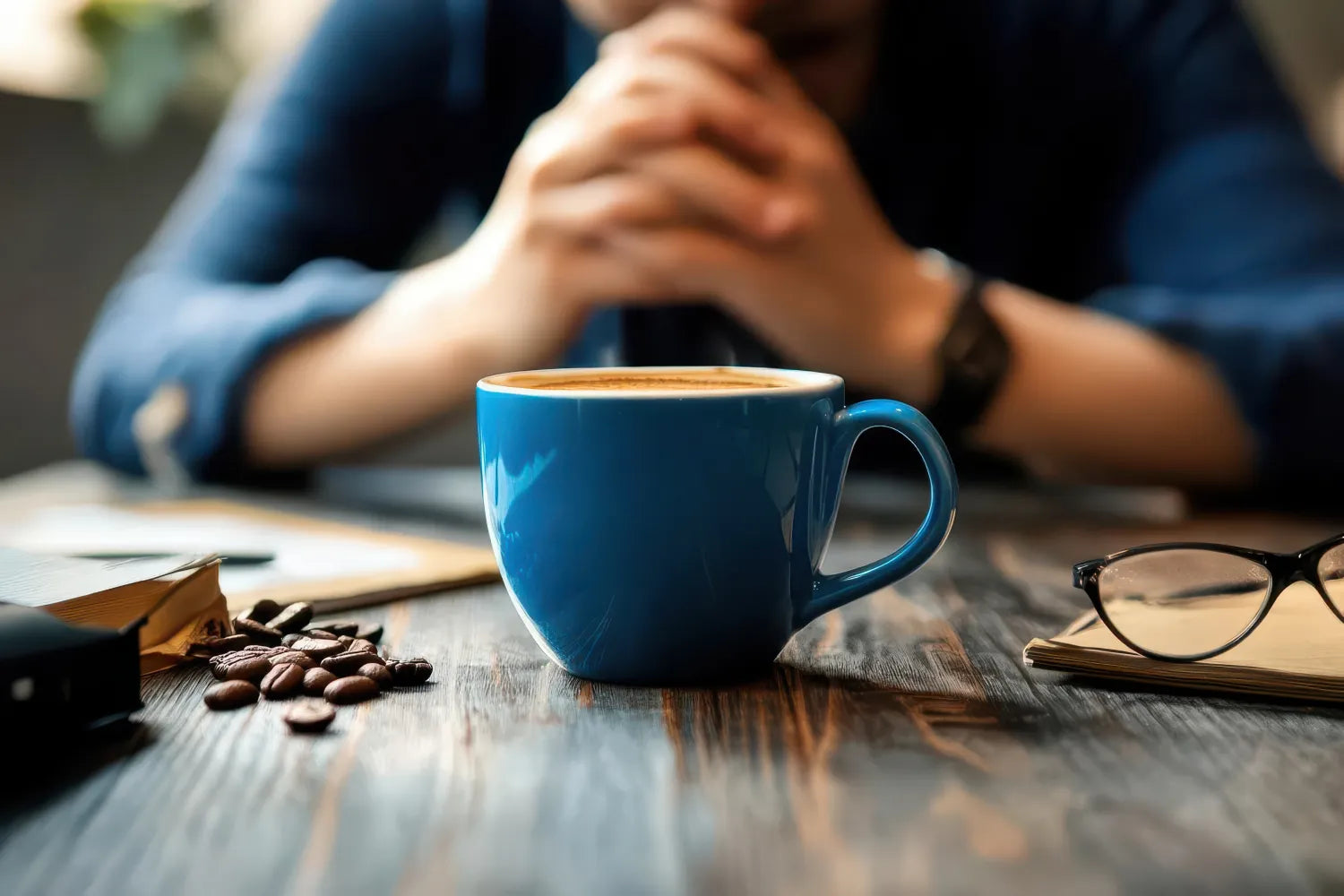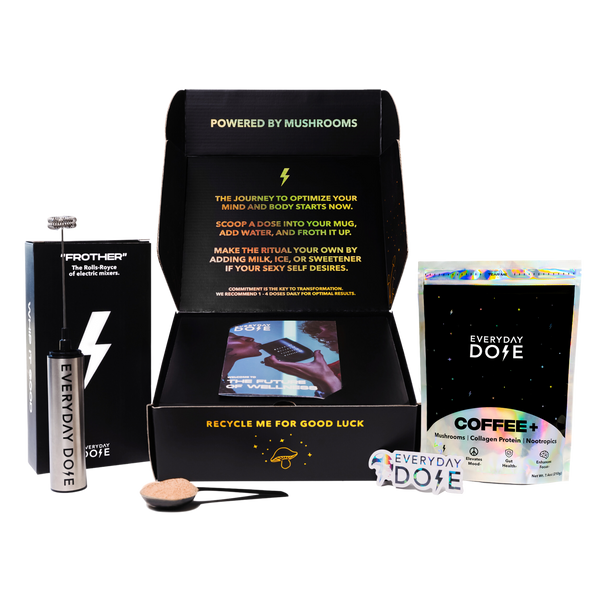How To Get Rid of Caffeine Jitters: 5 Remedies

When you’re on the go, it’s easy to drink more coffee than you intended. Maybe you have a cup with breakfast, one on the way to work, another over lunch, and a 2 PM cuppa to get you to the end of your work day.
The problem with drinking tons of coffee is that many people are overconsuming caffeine without realizing it. Before you know it, you’re paralyzed by jitters, anxiety, and nausea from drinking too much coffee. Don’t worry, though — if this happens to you, we have a few tips to help you weather the storm.
What Are Caffeine Jitters?
You know that heart-racing, can’t-sit-still feeling you get after one too many cups of coffee? That’s caffeine jitters. Caffeine stimulates your central nervous system, which is what helps you feel awake and focused after a cup of joe — however, too much can push you into overdrive.
If you have caffeine jitters, you might experience the following symptoms:
- Restlessness
- Trembling hands
- Pounding heart
- Anxiety
- Sweating
But why does this happen? Some people are naturally more sensitive to caffeine, while others don’t hit their limit until they’ve had a triple-shot latte. It all comes down to how quickly your body metabolizes caffeine and how much you’ve consumed.
And that, ultimately, all comes down to genetics. Basically, there are ways you can reset your caffeine tolerance to feel more sensitive to caffeine, but your baseline caffeine sensitivity is what you’ll have for the rest of your life.
5 Ways To Soothe Caffeine Jitters
When you have caffeine jitters, it’s not just uncomfortable — it can actually affect everything else you have going on, too. Think about it. How likely are you to do well on a project when your heart is pounding out of your chest and your brain is going a million miles an hour?
For the most part, jitters just have to run their course. Your body will metabolize the caffeine in your system over time, and the jitters will eventually go away. That being said, there are some ways you can feel better before the jitters fully leave your system.
1. Stop Drinking Caffeine
Step one: put the coffee cup down! It might sound obvious, but stopping caffeine consumption is the quickest way to halt the escalation of jitters. Whether your vice is coffee, tea, energy drinks, or that sneaky piece of chocolate (yes, chocolate has caffeine in it), it’s important to give your system a chance to process the caffeine that’s already in your bloodstream.
It’s also helpful to avoid decaf coffee for the moment — yes, contrary to its name, decaffeinated coffee still contains a small amount of caffeine. By cutting off the source, you can help your body flush the caffeine out without continuing to add to the mix.
2. Hydrate, Hydrate, Hydrate
Caffeine dehydrates your body, so drinking water can be a fast, effective way to combat some of its side effects. Staying hydrated can help dilute the caffeine in your bloodstream, making it easier for your body to process and eliminate.
In general, it’s good to aim for a tall glass or two of water and sip it slowly to support your digestion and kidney function. As an added bonus, water also soothes the dry mouth and stomach irritation that often comes with drinking too much caffeine.
3. Sweat It Out
When you feel jittery, channel that excess energy into light exercise. Go for a brisk walk, stretch, or even do some yoga. Movement can help your body metabolize caffeine more quickly while releasing endorphins to counteract anxiety.
Plus, getting fresh air can clear your head and give your nervous system a chance to reset. Just remember to keep it low-impact — overexerting yourself might spike your heart rate even higher than it already is.
4. Try Some Deep Breathing
Deep breathing is a great way to help slow your heart rate and keep the anxiety at bay. One method you can try is diaphragmatic breathing.
To practice this technique, inhale deeply through your nose for four seconds, hold for four, and exhale for six. This activates your parasympathetic nervous system, which calms your body and reduces feelings of restlessness or anxiety.
5. Eat a Balanced Meal
If you’ve had too much caffeine on an empty stomach, you’re essentially pouring gasoline on a fire. Eating a balanced meal can help slow caffeine absorption and stabilize your blood sugar levels, which can help you avoid that shaky, jittery feeling.
Go for foods rich in fiber, protein, and healthy fats — think oatmeal with almond butter, a turkey sandwich on whole-grain bread, or avocado toast. Your body will feel more grounded, and the jitters may slowly start to fade as the food hits your system.
How To Avoid Caffeine Jitters in the First Place
They say prevention is the best medicine, and that’s true for caffeine jitters, too. First, keep tabs on your daily caffeine intake.
Many adults can handle up to 400 mg per day (that’s about four cups of coffee), but listen to your body — some of us hit our limit after a cup and a half, and that’s okay! It might even help to reduce your caffeine intake for a while as you try to find the sweet spot. You might find out that your ideal coffee intake is far less than you thought.
If you’re looking for a smart caffeine hack, try pairing your coffee with L-theanine. Found naturally in tea, this amino acid promotes feelings of relaxation without making you drowsy. Plus, when combined with caffeine, L-theanine can help mitigate the negative side effects, giving you focused energy without the jitters.
For the easiest solution out there, try our Mushroom Coffee+. Our blend features coffee extract to provide that delicious coffee taste, collagen protein to help slow caffeine absorption, L-theanine to help mitigate the effects of caffeine, and lion’s mane and chaga mushrooms to support gut and immune health. Plus, each serving contains only 45 mg of caffeine to help add an extra defense against jitters.
Are Caffeine Jitters Serious?
Sometimes, caffeine jitters can be more than just a minor annoyance. If you’re still feeling shaky or anxious hours after cutting back, or if your symptoms include dizziness or chest pain, it’s time to call in a professional.
For those with underlying health conditions like heart arrhythmias or anxiety disorders, even small amounts of caffeine can cause a bigger reaction. Don’t hesitate to reach out to a healthcare provider who can help you understand your body’s unique needs.
Remember, caffeine isn’t the enemy — it’s all about finding the right balance for you. And if you need support, professionals are there to help you enjoy your coffee (or tea) in peace.
The Bottom Line
Caffeine jitters are no fun — if you’ve had them, then you know exactly what we mean. That being said, you can lower some of the nasty side effects by stopping caffeine intake, drinking water, going on a walk, and practicing deep breathing.
Of course, the best way to minimize caffeine jitters is to avoid them in the first place. Our low-caf, L-theanine-packed blends can provide all the support you need to enjoy the mental alertness of coffee without getting jitters. Shop all of our blends today to find the right option for you!
Sources:
Chocolate, dark, 45- 59% cacao solids | USDA
Does Coffee Really Dehydrate You? | Cleveland Clinic
Deep Breathing and Relaxation | University of Toledo
Is It OK To Drink Coffee on an Empty Stomach? | Cleveland Clinic
What doctors wish patients knew about the impact of caffeine | AMA








